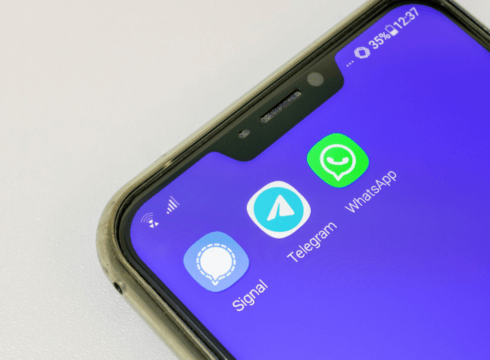The Broadband India Forum said that any move to create a category of “Super Authorisation” would consolidate power within the hands of a few and create an anti-competitive landscape
The IAMAI said that OTT platforms contribute “highly” towards driving revenue for the telcos and create demand for online content
This comes days after telcos Reliance Jio, Bharti Airtel, and Vodafone Idea called on TRAI to bring OTT communication apps under its ambit
Inc42 Daily Brief
Stay Ahead With Daily News & Analysis on India’s Tech & Startup Economy
Industry bodies representing apps such as WhatsApp and Google RCS have lashed out at the demand of telecom operators to bring over-the-top (OTT) communication apps under a licensing or authorisation regime.
The Broadband India Forum (BIF) said that a single authorisation regime would be arbitrary and “greatly damage” the regulatory framework, adding that different services require different terms and conditions.
The comments came in response to the Telecom Regulatory Authority of India’s (TRAI) consultation paper seeking inputs on service authorisations under the newly passed Telecommunications Act.
This comes days after Reliance Jio, Bharti Airtel, and Vodafone Idea (Vi) called on the telecom regulator to overhaul the existing telecom licensing regime and bring OTT communication apps under its ambit.
TRAI is slated to host an open-house discussion on the consultation paper on August 21.
The BIF also said that any move to create a category of “Super Authorisation” would consolidate power within the hands of a few, create an anti-competitive landscape and result in imposition of unnecessary regulatory burden for those service providers who “only wish to provide a specific service or in a specific licence area”.
Meanwhile, industry body Internet and Mobile Association of India (IAMAI) said that OTT service providers operate on the application layer and as such do not fall within the scope of the Act.
“From a technical perspective, TSPs (telecom service providers) operate on the network side, while OTT providers operate on the application layer. Therefore, there is a clear distinction in the operational and technical and nature of OTT service providers and TSPs,” the IAMAI said.
Claiming that OTT apps are not riding “free” on telcos, the IAMAI also said that these platforms contribute “highly” towards driving revenue for the telcos and create demand for online content.
Training guns at telcos, the Asia Internet Coalition (AIC) said the arguments of telecom operators around “level playing field” are unfounded. It added that similar licensing mandates cannot be applied to fundamentally different services.
Chiming in, software industry body Nasscom also said that imposing a licensing framework on OTT communication platforms will impose entry costs, increase the cost of service for end consumers and “stymie” the OTT economy.
On similar lines, the US-India Strategic Partnership Forum (USISPF) also claimed that creating a “controlled licensing and pre-authorisation regime” for OTTs platforms may have a “vitiating effect” on India’s internet ecosystem and pose hurdles to the operation of OTT platforms in the country.
“Given that a large number of OTT platforms are startups or small sized, the effects of introduction of pre-authorisation regime on the Indian digital space may be compounded,” the USISPF added.
The long list of comments came just a couple of days after the telcos and Cellular Operators Association of India (COAI), in their submission to TRAI, called on the government to bring call and messaging apps like WhatsApp, Signal and Telegram under the new Telecommunication Act’s licencing framework.
{{#name}}{{name}}{{/name}}{{^name}}-{{/name}}
{{#description}}{{description}}...{{/description}}{{^description}}-{{/description}}
Note: We at Inc42 take our ethics very seriously. More information about it can be found here.


